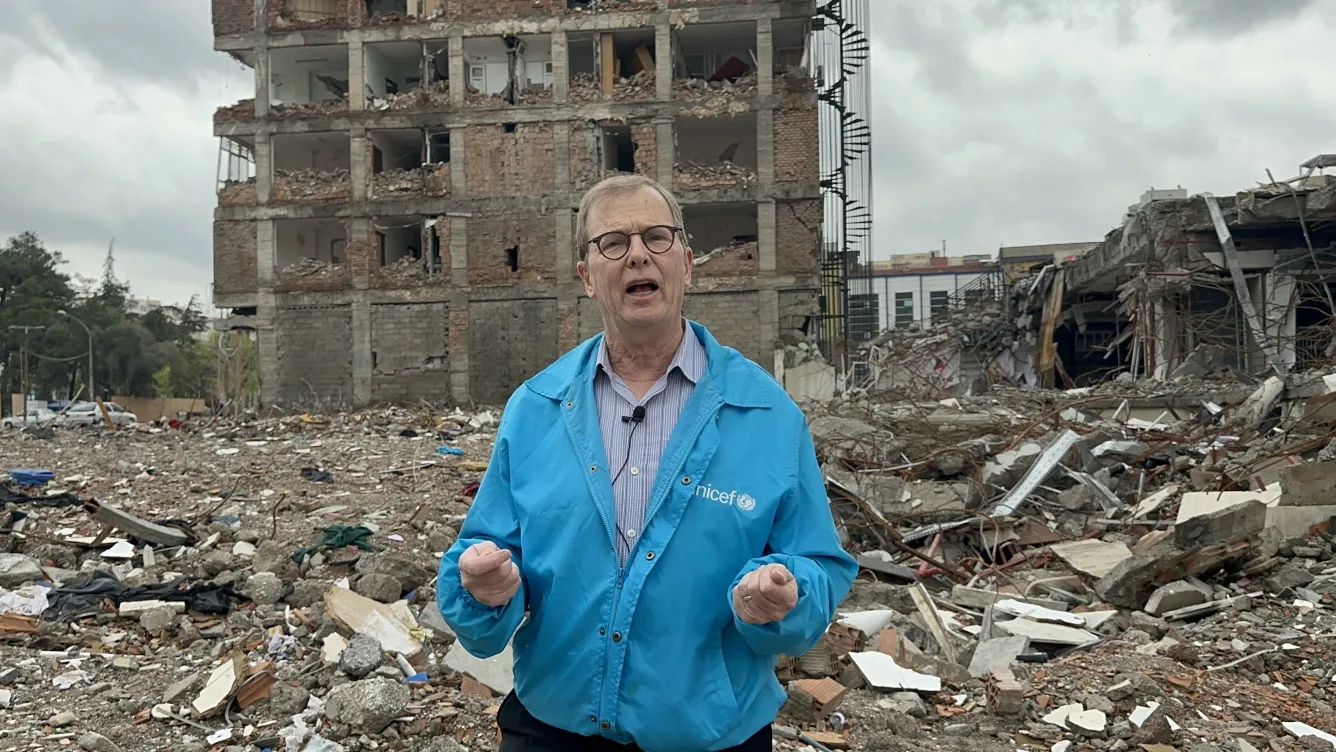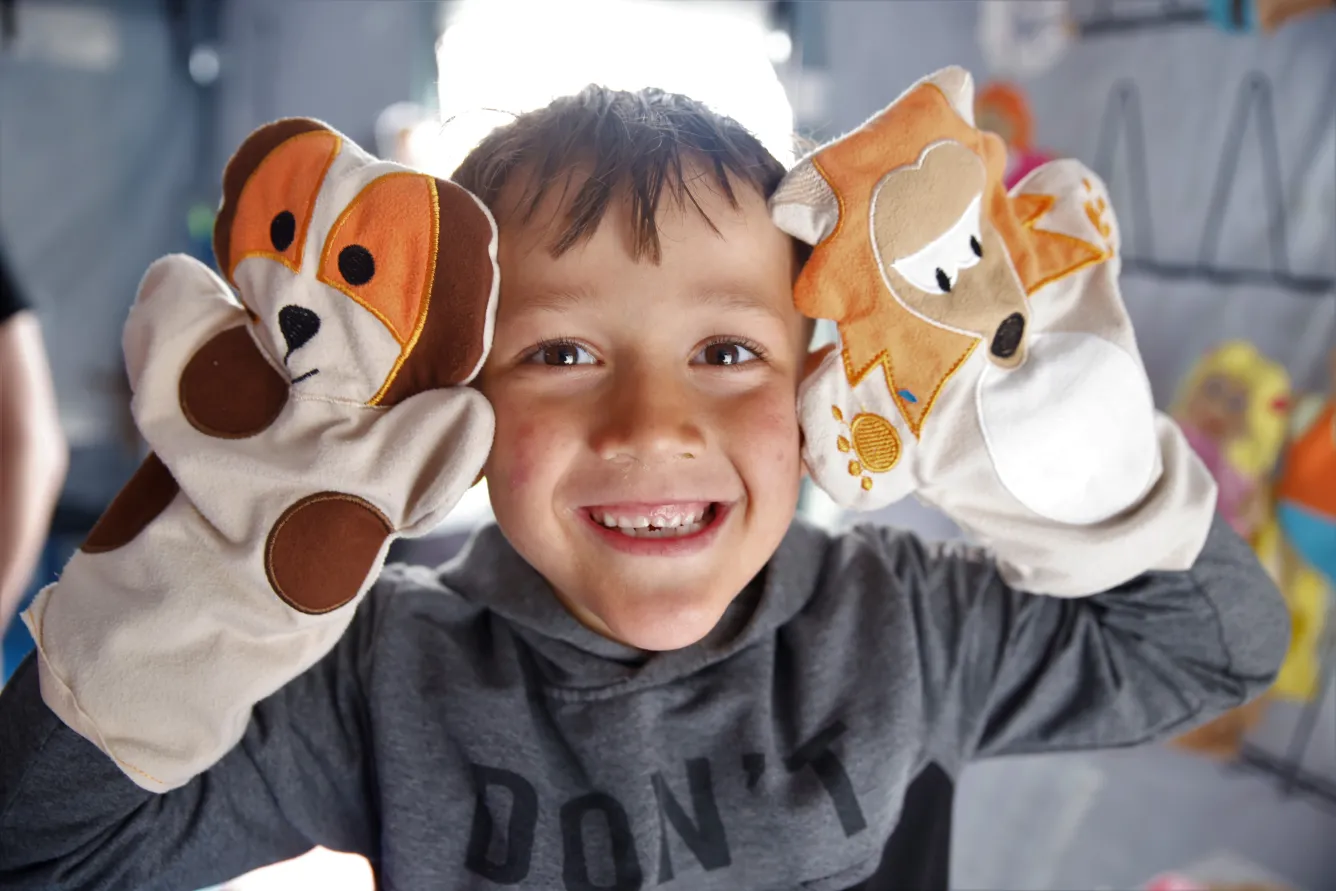The bravest kids in the world: Going back to school after the Türkiye earthquake
By David Morley, UNICEF Canada President and CEO

Gaziantep, Türkiye: There is a large rubble field in Nurdagi, close to the epicenter, where ruined buildings still stand eight storeys tall. An old man pointed up to where we could see a room through a missing wall. “I was there. I grabbed onto a column and knew I was going to die, but I didn’t. Our son and daughter-in-law lived in that building over there,” he pointed to another shattered building. “They were on the fourth floor. She was due to give birth, but he carried her outside to safety. We will never go back inside that place.” He pointed to the left of his old building where there was nothing. “There was another building there. Forty-six people died.”
One of the places where survivors are living is at a nearby university. Tents are dotted around the campus, on parking lots and playing fields.
One of those big movie set trailers we see around Toronto was parked in front of the Faculty of Dentistry building. But it wasn’t for a movie, it was a mobile-child friendly space and it’s been here since all these people moved in.
As we chatted with some people, rain suddenly poured down and we ran into the trailer just ahead of a group of kids who were coming for a session of play. At least, they are playing; the skilled group of young adults who are leading them use the games to help the children start to move on from their trauma, to begin, somehow, to heal.
Demir is one of the workers here. He describes some of the games they play – games about feelings; games with building blocks. “I’m going to build a house so strong”, one little boy told Demir, “that it’ll never fall down.” In the middle of one of the games there was a massive crack of thunder and in an instant one little girl’s face was transformed by fear – then she took a big breath, gathered herself, and went back to playing with her friends.

A tent, a principal with a mission and children ready to learn
The child-friendly space also helps the children get ready for school. But in the village of Incirli, not too far outside of the city, one of those many local heroes UNICEF gets to work with, was already helping children get back to school.
Incirli sits in a beautiful green fertile valley, but it was not spared by the earthquake. When the earthquake hit, Arif, the principal of the village school, lost his home. For three days he, his wife and their three children – including a newborn just 40 days old – lived in their car. Once the roads became passable, Arif took the family to his in-laws who lived in a safer part of Türkiye, and then returned to the village.
The school had been damaged, not destroyed, but it wasn’t safe to go in. So, Arif connected with UNICEF, got one of UNICEF’s big tents and some teaching equipment, pitched it in the school playground and hung plastic sheeting inside it to make 4 classrooms – and that’s where he re-opened the school. As the days went by, he got more tents, more equipment, advocated for government engineers to assess the damage to the building and repair it, and a few weeks ago the school was declared fit to use.
But the children were afraid to go in.
Arif and the other teachers didn’t push the kids. They talked about what the engineers had found, what they had done to fix the building, and that, of course, they would never let the children go into a place that wasn’t safe. The teachers used the staffroom, so the children saw them going in and out of the school. But still, they didn’t want to go in.
Until today.
That thunderstorm which had so frightened the girl in the child-friendly space, had drenched the playground and the tents too. The older kids started to say that maybe it would be better to be inside, that it was time to overcome their fears. The younger ones, the Grade Ones and Twos weren’t so sure. So, the little ones stayed in their tent – it was the driest anyhow – and the others ran through the pelting rain and into the school. They did it! They were back in their school!
That display of courage by the children gave me a jolt of hope. It is going to take many years of perseverance, money, leadership, incredibly hard work and healing to overcome the catastrophe caused by this earthquake. But there was something when I saw those brave children in that school this afternoon. I realized that this disaster can be overcome.
Supporting partners in Syria and Türkiye to ensure children continue learning
Since the earthquake hit in February, millions of children have seen their education disrupted in the region. Children have not only lost their homes, they have also lost the safety of their schools, along with their most foundational spaces for learning. Schools provide more than a place for education; they also enable a sense of normalcy, and a way to help children cope with the trauma of disaster.
To-date, UNICEF has reached more than 212,730 children and caregivers across Türkiye with mental health and psychosocial support and psychological first aid, as part of the humanitarian response and early recovery.
UNICEF is supporting the government in Türkiye to ensure the continuity of education, early childhood development services, and learning in temporary accommodation. This includes providing recreational, teaching and learning materials. UNICEF will also support the Government’s plans to set up school tents and prefabricated classrooms in locations where school buildings can no longer be used.
